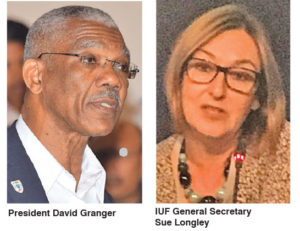The International Union of Food, Agricultural, Hotel, Restaurant, Catering, Tobacco and Allied Workers’ Association (IUF), an international trade union confederation, through its General Secretary Sue Longley, has written to President David Granger expressing strong concerns over the downsizing of sugar.
The IUF has strongly urged the President that his Government “…actively look at the plight that has befallen the thousands of workers of the sugar industry who have lost their livelihood…” The trade union body said the situation “…if left unchecked, would not be in the interest of your beautiful country and hospitable people.”

In its letter to President Granger, the IUF, which speaks on behalf of 10 million workers through its 422 affiliated unions in 131 countries, said it was aware that the sugar industry “…has made substantial contributions to your country’s national life and development…Its role as a national institution cannot be diminished, especially recognising the absence of alternatives at this time.”
The IUF said bearing those factors in mind and taking into account the information it has been receiving, it could not help but be saddened by what has taken place. “From our vantage point, we cannot fail to express our view that very little thought has been given to address the well-being and welfare of the thousands who have been affected. The impact, we have learnt, has been nothing short of significant and the disruption of village economies and the social fabric of communities, for us, is disturbing.”
Moreover, the IUF said it was aware that the coalition Government, despite being advised to, did not pursue any considered study to get a better grasp of the eventualities that would flow from its reform plans. As such, the international body told the President in the missive that it was not the wisest of positions.
Nevertheless, the IUF said too many Guyanese men, women, and children have found themselves facing tough and difficult times. “We are sure, Mr President, that you cannot be comforted by this fact. I should add, Mr President, that earlier this year during a visit to Guyana, myself and colleagues had an opportunity to meet a group of these workers,” the statement added.
For the IUF, hearing first hand from the workers, their stories of survival and struggle as they live day in and day out, was heart rending and very moving. “It is difficult, therefore, for us to imagine what has taken place in the days and weeks that followed that interaction,” it added.
Longley, in an exclusive interview with Guyana Times International in January, had said that her organisation has been paying keen attention to the developments in the sugar industry. “We have been following this closely for some time. We’ve worked historically in sugar to improve working conditions with a view to having a stronger and healthy sugar sector in the Caribbean,” she said.
The IUF official noted that it has been a concern for her organisation with the changes taking place in the Caribbean regarding sugar, starting with St Kitts and Barbados. “We were hoping that remaining producers like Guyana would remain very much committed to the industry,” she added.
Asked to comment on the manner in which the retrenchment took place, Longley said, “Like we’ve heard, it’s not just figures on paper, but there is a very human impact or cost on those retrenchments. And we take note of the suicides that have taken place as a result of this.”
In November, the Guyana Sugar Corporation (GuySuCo) first announced plans to dismiss thousands of workers, which it did. The Guyana Agricultural and General Workers’ Union (GAWU) says the downsizing and subsequent closure of sugar estates would lead to the loss of more than 15,000 jobs, and the potential threat of poverty for 50,000 to 100,000 people.
In May 2017, Government announced plans to close the Enmore and Rose Hall Sugar Estates, sell the Skeldon Sugar Factory, reduce the annual production of sugar, and take on the responsibility of managing the drainage and irrigation services offered by GuySuCo.
Related posts
-

Ramkarran says GECOM’s 15-day deadline to announce results “not mandatory”
The 15-day deadline referenced in the Representation of the People Act, within which the Guyana Elections... -

Linden man knifes woman and lover to death in jealous rage
A man is in Police custody after he reportedly stabbed his ex-lover and her new spouse... -

Mottley says “there are forces that do not want to see votes recounted”
Chairperson of the Caribbean Community (Caricom), Barbadian Prime Minister Mia Mottley, in a strongly-worded statement said...
